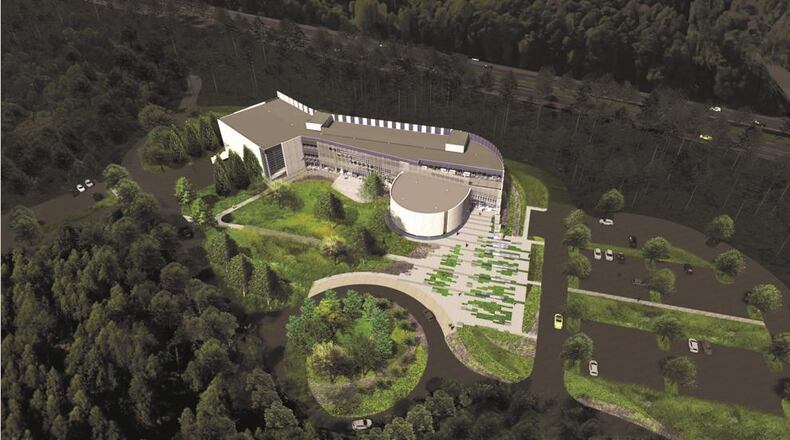The cost of building Gwinnett's "water innovation center" — a facility officials hope will become a global hub for water treatment research, technology and training — is now estimated to be around $60 million, nearly twice the amount of original projections.
Officials believe it will be worth it.
Gwinnett Commissioner John Heard envisions the facility — which will be paid for through water department capital funds — eventually luring businesses and corporations. He imagines jobs galore.
He foresees so much growth around the center that “20 years from now, you’re gonna come here and people are gonna say, ‘Why did they build this little $60 million facility in the midst of all of this big, huge development?’”
Tuesday afternoon, the county broke ground on the center, which will be built over the next three years or so. It will go up on land wedged in between I-985 and I-85 near Buford, on the same 700-acre site that currently includes the Gwinnett Environmental and Heritage Center and the county’s already-renowned F. Wayne Hill Water Resources Center.
The latter treats tens of millions of gallons of wastewater each day and returns them to Lake Lanier, the region’s most vital water source. It’s considered one of the most technologically advanced treatment facilities in the country.
The new innovation center would only add to its reputation, officials said.
On its face alone, the center would indeed be unlike anything that currently exists in the United States, said Melissa Meeker, the project's director of development. Plenty of facilities focus on individual specialties, Meeker said — but Gwinnett's will be a truly multipurpose campus.
Officials envision dedicated lab space where the center's own scientists and those from universities or businesses can work together to explore and solve problems in the industry. Gwinnett already has partnerships with institutions like Georgia Tech, the University of Georgia and Johns Hopkins University and wants to step up those collaborative efforts.
Businesses and entrepreneurs also will be able to develop and test new technologies on the site. At least one company, Duluth-based AdEdge Water Technologies, has already publicly expressed interest.
The ultimate goal, Gwinnett Commission Chairman Charlotte Nash said, will be for companies to either locate directly on the innovation center campus in some fashion, or to set up shop nearby. The construction costs went from the $30 million figure released in 2017 to $60 million due to added square footage (around 60,000 rather than roughly 46,000) and “more refined cost estimates,” Nash said.
Overall, the building will include wet and dry laboratory spaces, classrooms, conference rooms, a 250-seat auditorium and a three-story demonstration bay with access to multiple F. Wayne Hill water streams, officials said.
An expansive hands-on training facility for Georgia’s water professionals also will be a prominent feature at the innovation center. Officials hope such training will allow the industry to better cultivate — and hold on to — the workforce of the future.
There will be a public education component as well.
“I can see this becoming ‘Environmental Valley’ for the Southeast, and for the entire country,” said Aris Georgakakos, the director of Georgia Tech’s Georgia Water Resources Institute.
Multiple county officials echoed that sentiment Tuesday: Gwinnett, the Silicon Valley of the water industry.
“This is not a regional or a national project,” Heard said. “It’s a global undertaking.”
About the Author
Keep Reading
The Latest
Featured





